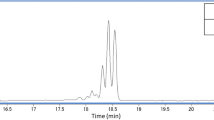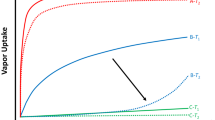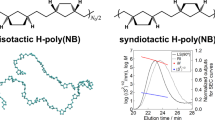Abstract
A RECENT communication by Barnard and Hughes1 described the gas chromatographic separation of ethane, ethylene, propane and propylene. Two column packings were used, triisobutylene on ‘Celite’ and ethylene glycol saturated with silver nitrate on ‘Celite’. It was claimed that the four gases were separated on a column packed with a mixture of the two packings, whereas the same proportions arranged in two separate columns in series did not effect the same separation. As the two liquids are immiscible, the reported result is not in accordance with expectation ; a series of experiments have been carried out to check this conclusion.
This is a preview of subscription content, access via your institution
Access options
Subscribe to this journal
Receive 51 print issues and online access
$199.00 per year
only $3.90 per issue
Buy this article
- Purchase on Springer Link
- Instant access to full article PDF
Prices may be subject to local taxes which are calculated during checkout
Similar content being viewed by others
References
Barnard, J. A., and Hughes, H. W. D., Nature, 183, 250 (1959).
Author information
Authors and Affiliations
Rights and permissions
About this article
Cite this article
PRIMAVESI, G. Analysis of Light Hydrocarbons. Nature 184, 2010–2011 (1959). https://doi.org/10.1038/1842010b0
Issue Date:
DOI: https://doi.org/10.1038/1842010b0
This article is cited by
-
Application of a flow-tunable, serially coupled gas chromatographic capillary column system for the analysis of complex mixtures
Chromatographia (2000)
-
Selectivity tuning of serially connected open-tubular (capillary) columns in gas chromatography. Part I: Fundamental relationships
Chromatographia (1986)
-
Application of transition metal complex formation in gas chromatography, part I
Chromatographia (1979)
Comments
By submitting a comment you agree to abide by our Terms and Community Guidelines. If you find something abusive or that does not comply with our terms or guidelines please flag it as inappropriate.



